Organizational Culture, Power, and Behaviour at Morrison's
VerifiedAdded on 2022/12/27
|20
|6158
|2
Report
AI Summary
This report provides a detailed analysis of organizational behaviour within the context of Morrison's supermarket, a major UK retailer. It begins by defining organizational culture, power, and politics and examines their influence on both team and individual performance. The report explores various models and theories, including Handy's organizational culture model, Hofstede's cultural dimensions, and French and Raven's types of power, relating them specifically to Morrison's. It then evaluates the application of content and process theories of motivation, such as Maslow's Hierarchy of Needs and Vroom's expectancy theory, and how these can be used to enhance employee performance and achieve organizational goals. The report further differentiates between effective and ineffective teams, outlining group and team development theories to foster cooperation. Finally, it applies organizational behaviour concepts to a given business situation within Morrison's, assessing how these principles influence behaviour and inform decision-making within the company.
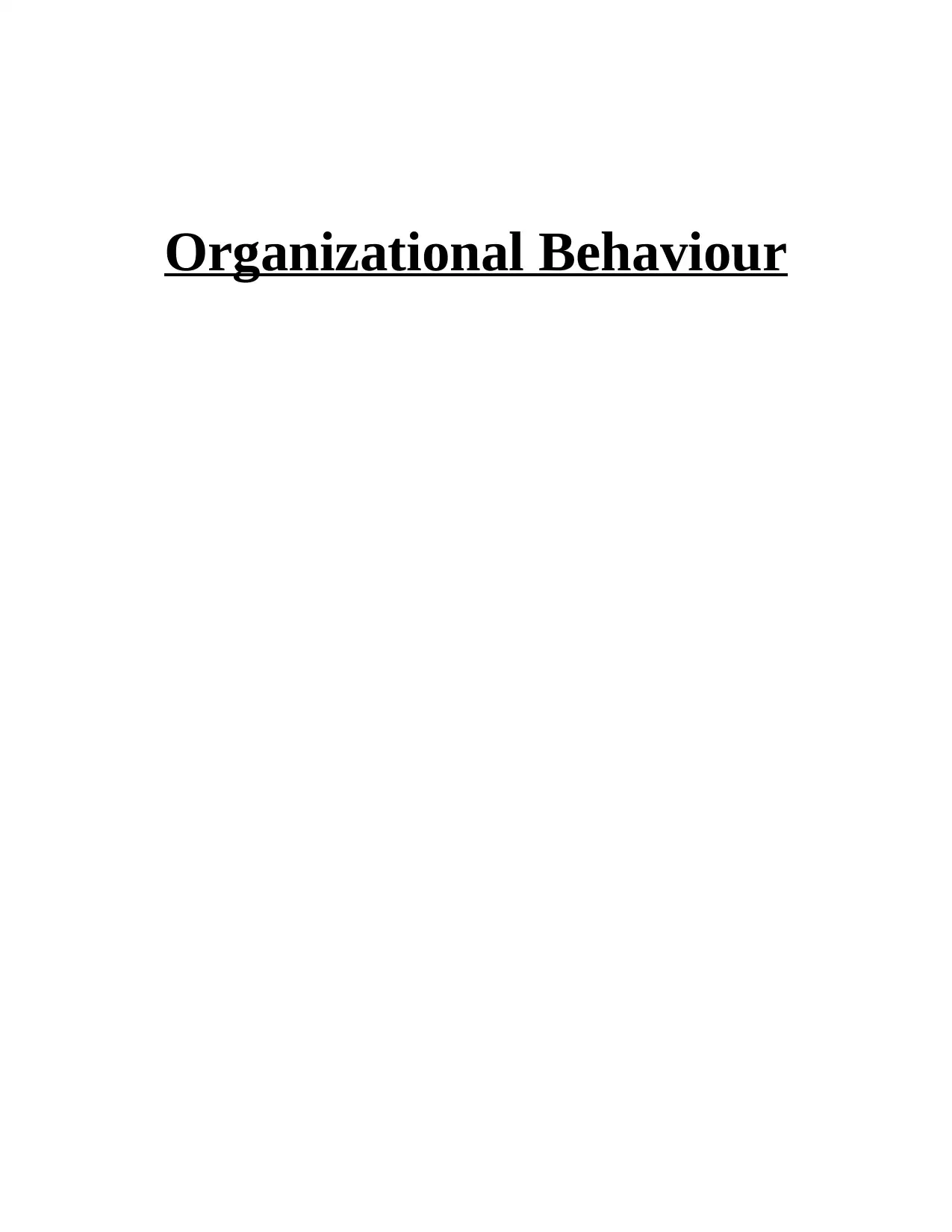
Organizational Behaviour
Paraphrase This Document
Need a fresh take? Get an instant paraphrase of this document with our AI Paraphraser
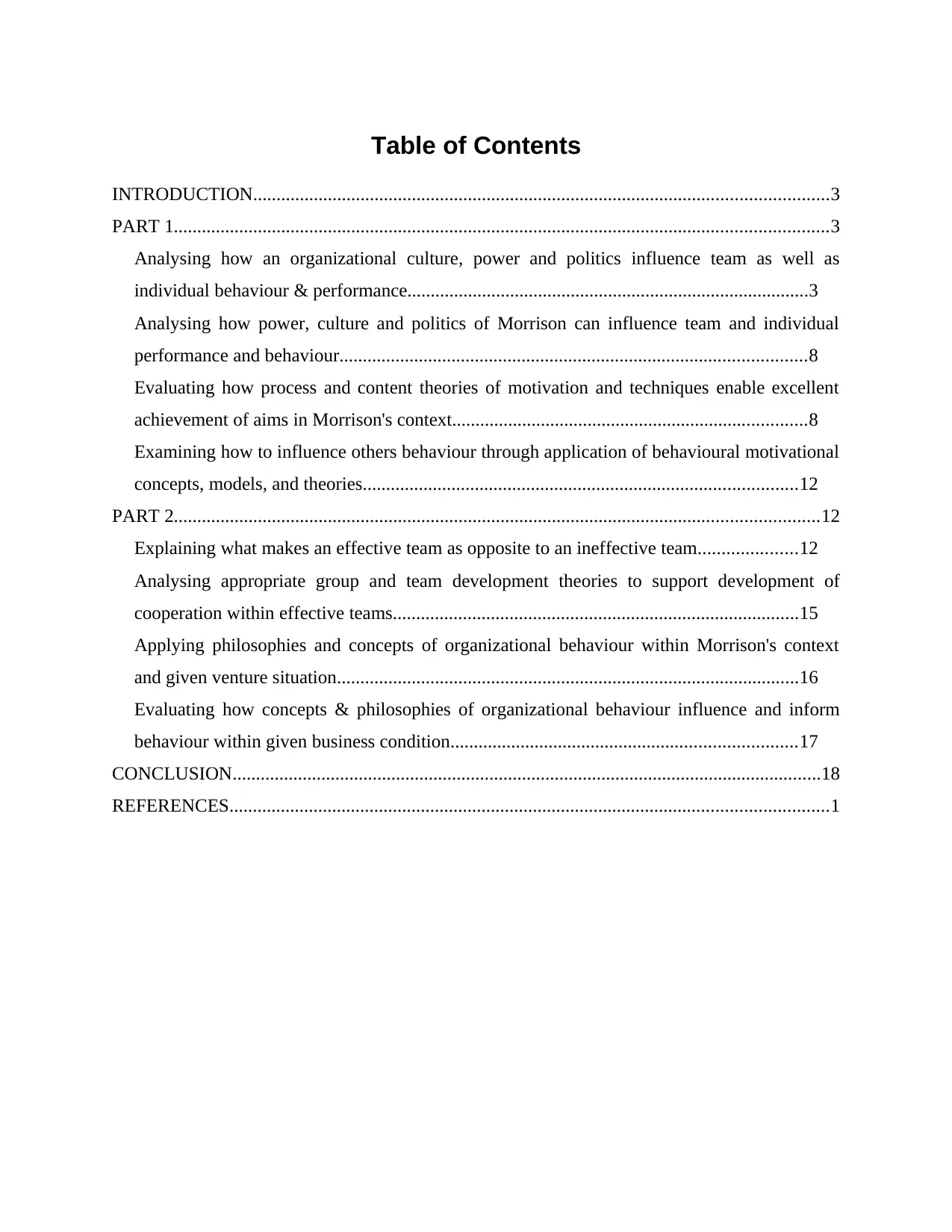
Table of Contents
INTRODUCTION...........................................................................................................................3
PART 1............................................................................................................................................3
Analysing how an organizational culture, power and politics influence team as well as
individual behaviour & performance......................................................................................3
Analysing how power, culture and politics of Morrison can influence team and individual
performance and behaviour....................................................................................................8
Evaluating how process and content theories of motivation and techniques enable excellent
achievement of aims in Morrison's context............................................................................8
Examining how to influence others behaviour through application of behavioural motivational
concepts, models, and theories.............................................................................................12
PART 2..........................................................................................................................................12
Explaining what makes an effective team as opposite to an ineffective team.....................12
Analysing appropriate group and team development theories to support development of
cooperation within effective teams.......................................................................................15
Applying philosophies and concepts of organizational behaviour within Morrison's context
and given venture situation...................................................................................................16
Evaluating how concepts & philosophies of organizational behaviour influence and inform
behaviour within given business condition..........................................................................17
CONCLUSION..............................................................................................................................18
REFERENCES................................................................................................................................1
INTRODUCTION...........................................................................................................................3
PART 1............................................................................................................................................3
Analysing how an organizational culture, power and politics influence team as well as
individual behaviour & performance......................................................................................3
Analysing how power, culture and politics of Morrison can influence team and individual
performance and behaviour....................................................................................................8
Evaluating how process and content theories of motivation and techniques enable excellent
achievement of aims in Morrison's context............................................................................8
Examining how to influence others behaviour through application of behavioural motivational
concepts, models, and theories.............................................................................................12
PART 2..........................................................................................................................................12
Explaining what makes an effective team as opposite to an ineffective team.....................12
Analysing appropriate group and team development theories to support development of
cooperation within effective teams.......................................................................................15
Applying philosophies and concepts of organizational behaviour within Morrison's context
and given venture situation...................................................................................................16
Evaluating how concepts & philosophies of organizational behaviour influence and inform
behaviour within given business condition..........................................................................17
CONCLUSION..............................................................................................................................18
REFERENCES................................................................................................................................1
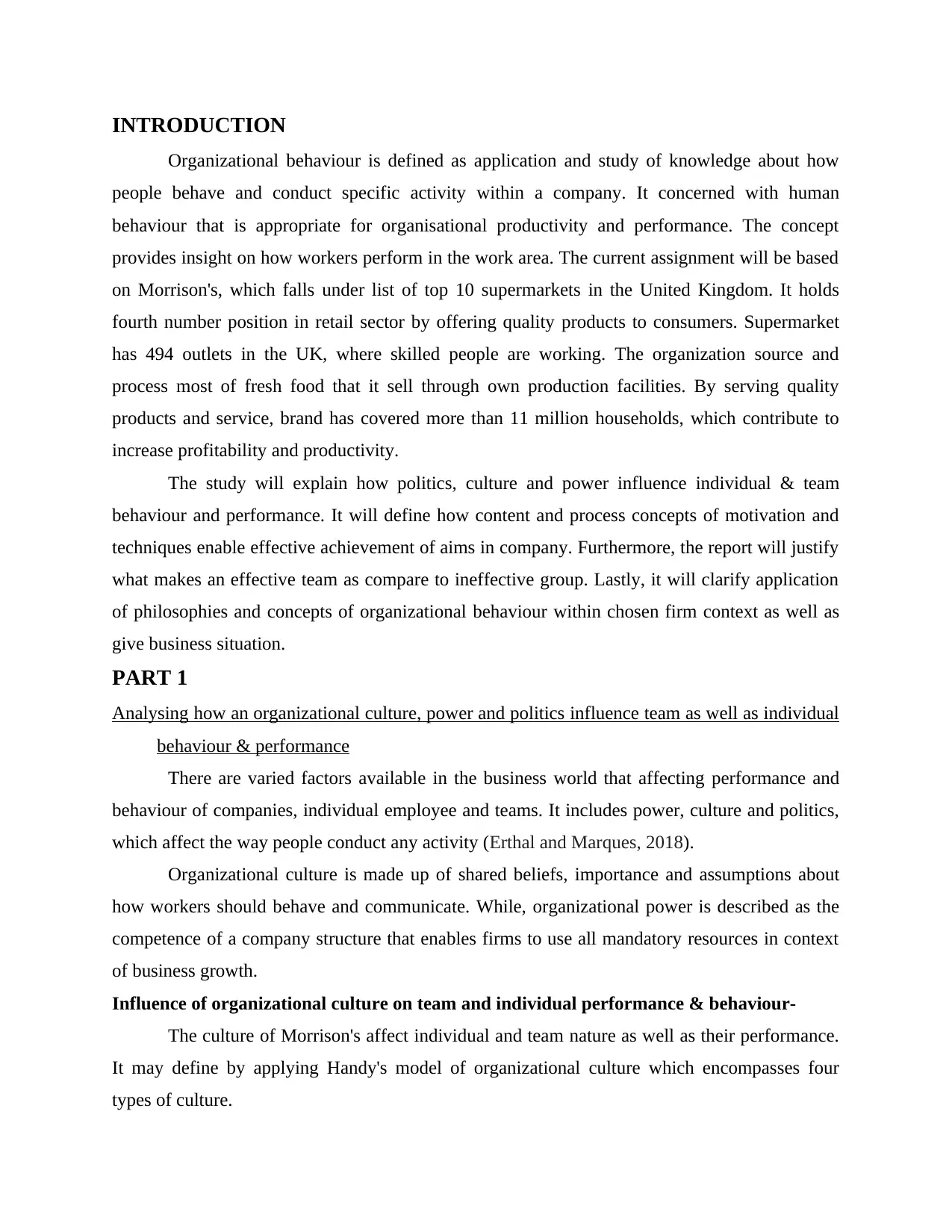
INTRODUCTION
Organizational behaviour is defined as application and study of knowledge about how
people behave and conduct specific activity within a company. It concerned with human
behaviour that is appropriate for organisational productivity and performance. The concept
provides insight on how workers perform in the work area. The current assignment will be based
on Morrison's, which falls under list of top 10 supermarkets in the United Kingdom. It holds
fourth number position in retail sector by offering quality products to consumers. Supermarket
has 494 outlets in the UK, where skilled people are working. The organization source and
process most of fresh food that it sell through own production facilities. By serving quality
products and service, brand has covered more than 11 million households, which contribute to
increase profitability and productivity.
The study will explain how politics, culture and power influence individual & team
behaviour and performance. It will define how content and process concepts of motivation and
techniques enable effective achievement of aims in company. Furthermore, the report will justify
what makes an effective team as compare to ineffective group. Lastly, it will clarify application
of philosophies and concepts of organizational behaviour within chosen firm context as well as
give business situation.
PART 1
Analysing how an organizational culture, power and politics influence team as well as individual
behaviour & performance
There are varied factors available in the business world that affecting performance and
behaviour of companies, individual employee and teams. It includes power, culture and politics,
which affect the way people conduct any activity (Erthal and Marques, 2018).
Organizational culture is made up of shared beliefs, importance and assumptions about
how workers should behave and communicate. While, organizational power is described as the
competence of a company structure that enables firms to use all mandatory resources in context
of business growth.
Influence of organizational culture on team and individual performance & behaviour-
The culture of Morrison's affect individual and team nature as well as their performance.
It may define by applying Handy's model of organizational culture which encompasses four
types of culture.
Organizational behaviour is defined as application and study of knowledge about how
people behave and conduct specific activity within a company. It concerned with human
behaviour that is appropriate for organisational productivity and performance. The concept
provides insight on how workers perform in the work area. The current assignment will be based
on Morrison's, which falls under list of top 10 supermarkets in the United Kingdom. It holds
fourth number position in retail sector by offering quality products to consumers. Supermarket
has 494 outlets in the UK, where skilled people are working. The organization source and
process most of fresh food that it sell through own production facilities. By serving quality
products and service, brand has covered more than 11 million households, which contribute to
increase profitability and productivity.
The study will explain how politics, culture and power influence individual & team
behaviour and performance. It will define how content and process concepts of motivation and
techniques enable effective achievement of aims in company. Furthermore, the report will justify
what makes an effective team as compare to ineffective group. Lastly, it will clarify application
of philosophies and concepts of organizational behaviour within chosen firm context as well as
give business situation.
PART 1
Analysing how an organizational culture, power and politics influence team as well as individual
behaviour & performance
There are varied factors available in the business world that affecting performance and
behaviour of companies, individual employee and teams. It includes power, culture and politics,
which affect the way people conduct any activity (Erthal and Marques, 2018).
Organizational culture is made up of shared beliefs, importance and assumptions about
how workers should behave and communicate. While, organizational power is described as the
competence of a company structure that enables firms to use all mandatory resources in context
of business growth.
Influence of organizational culture on team and individual performance & behaviour-
The culture of Morrison's affect individual and team nature as well as their performance.
It may define by applying Handy's model of organizational culture which encompasses four
types of culture.
⊘ This is a preview!⊘
Do you want full access?
Subscribe today to unlock all pages.

Trusted by 1+ million students worldwide
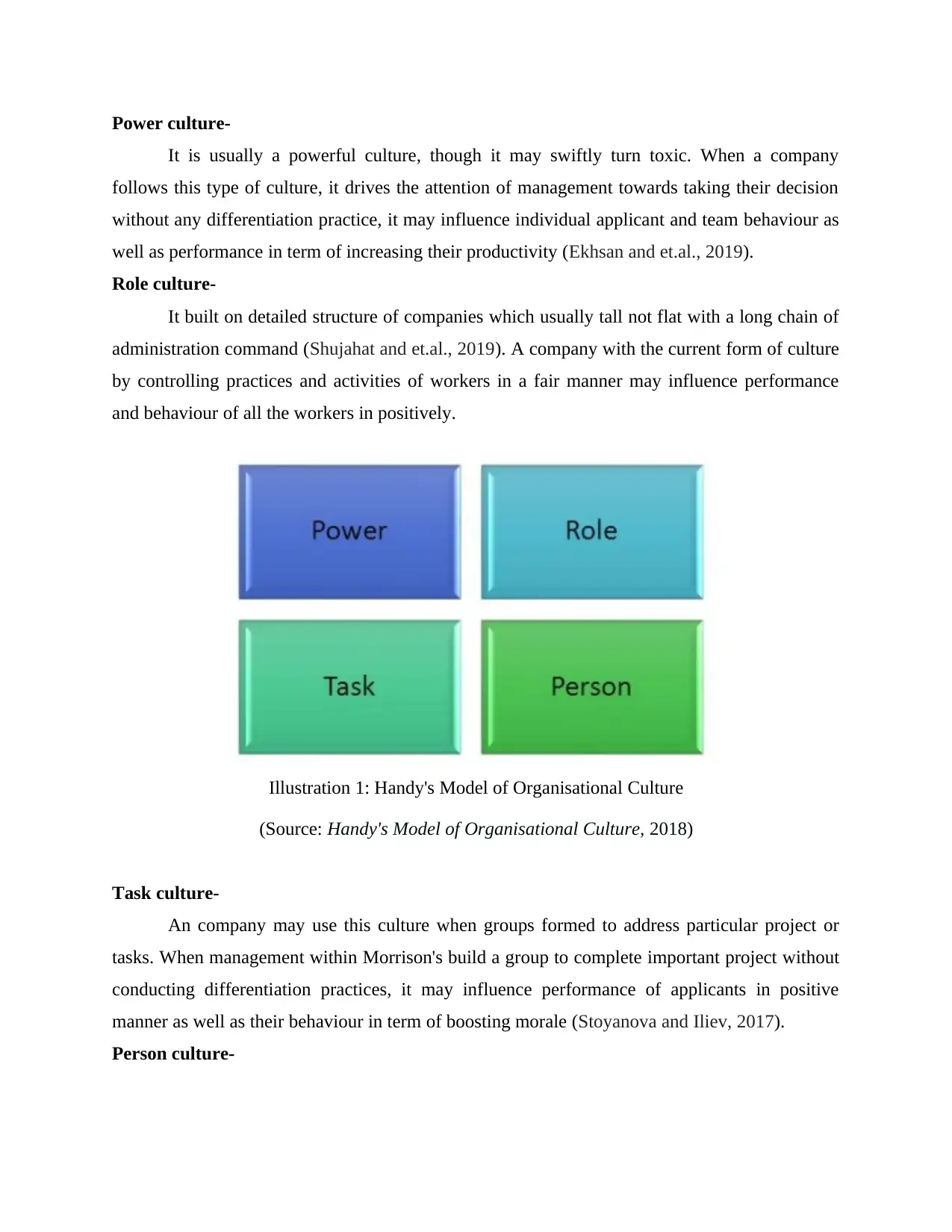
Power culture-
It is usually a powerful culture, though it may swiftly turn toxic. When a company
follows this type of culture, it drives the attention of management towards taking their decision
without any differentiation practice, it may influence individual applicant and team behaviour as
well as performance in term of increasing their productivity (Ekhsan and et.al., 2019).
Role culture-
It built on detailed structure of companies which usually tall not flat with a long chain of
administration command (Shujahat and et.al., 2019). A company with the current form of culture
by controlling practices and activities of workers in a fair manner may influence performance
and behaviour of all the workers in positively.
Task culture-
An company may use this culture when groups formed to address particular project or
tasks. When management within Morrison's build a group to complete important project without
conducting differentiation practices, it may influence performance of applicants in positive
manner as well as their behaviour in term of boosting morale (Stoyanova and Iliev, 2017).
Person culture-
Illustration 1: Handy's Model of Organisational Culture
(Source: Handy's Model of Organisational Culture, 2018)
It is usually a powerful culture, though it may swiftly turn toxic. When a company
follows this type of culture, it drives the attention of management towards taking their decision
without any differentiation practice, it may influence individual applicant and team behaviour as
well as performance in term of increasing their productivity (Ekhsan and et.al., 2019).
Role culture-
It built on detailed structure of companies which usually tall not flat with a long chain of
administration command (Shujahat and et.al., 2019). A company with the current form of culture
by controlling practices and activities of workers in a fair manner may influence performance
and behaviour of all the workers in positively.
Task culture-
An company may use this culture when groups formed to address particular project or
tasks. When management within Morrison's build a group to complete important project without
conducting differentiation practices, it may influence performance of applicants in positive
manner as well as their behaviour in term of boosting morale (Stoyanova and Iliev, 2017).
Person culture-
Illustration 1: Handy's Model of Organisational Culture
(Source: Handy's Model of Organisational Culture, 2018)
Paraphrase This Document
Need a fresh take? Get an instant paraphrase of this document with our AI Paraphraser
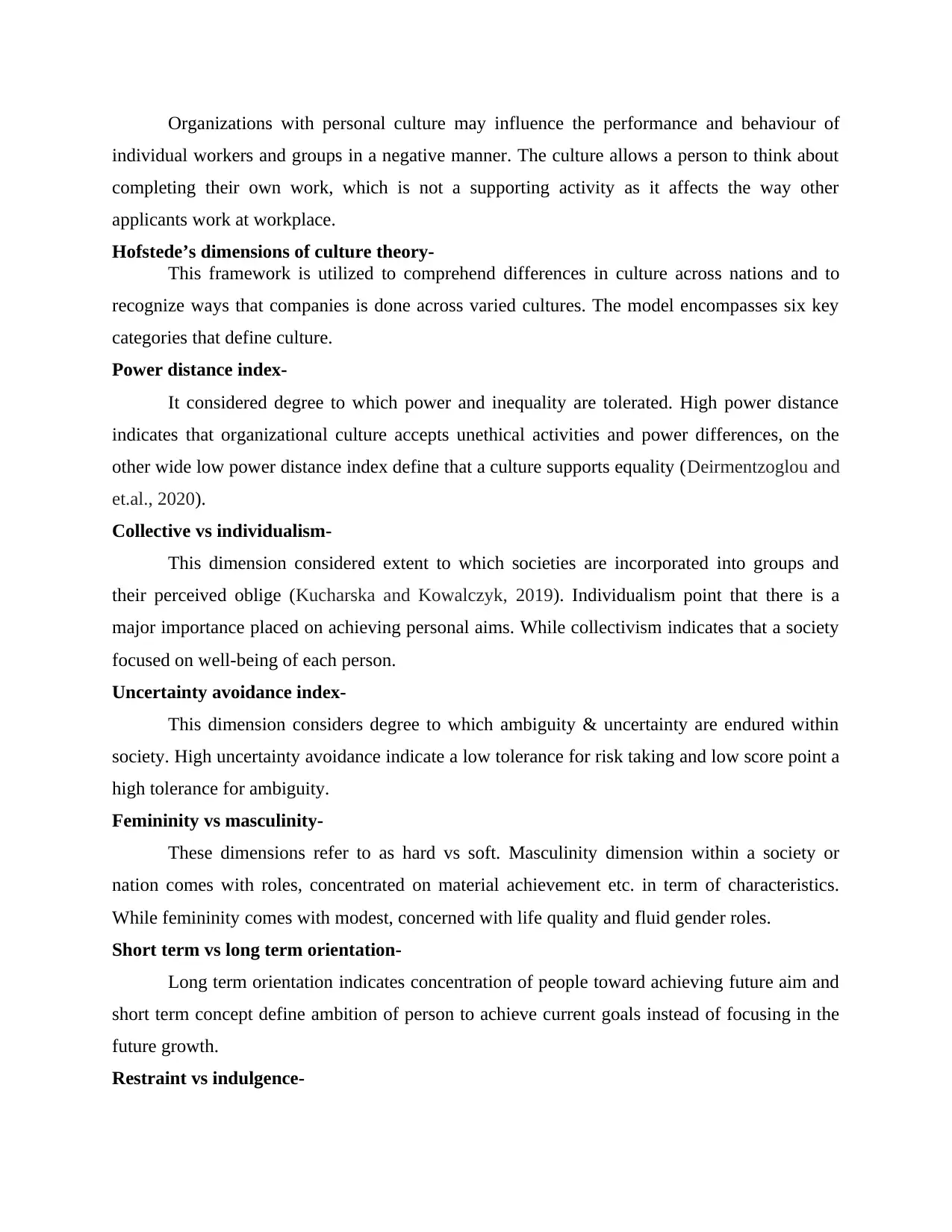
Organizations with personal culture may influence the performance and behaviour of
individual workers and groups in a negative manner. The culture allows a person to think about
completing their own work, which is not a supporting activity as it affects the way other
applicants work at workplace.
Hofstede’s dimensions of culture theory-
This framework is utilized to comprehend differences in culture across nations and to
recognize ways that companies is done across varied cultures. The model encompasses six key
categories that define culture.
Power distance index-
It considered degree to which power and inequality are tolerated. High power distance
indicates that organizational culture accepts unethical activities and power differences, on the
other wide low power distance index define that a culture supports equality (Deirmentzoglou and
et.al., 2020).
Collective vs individualism-
This dimension considered extent to which societies are incorporated into groups and
their perceived oblige (Kucharska and Kowalczyk, 2019). Individualism point that there is a
major importance placed on achieving personal aims. While collectivism indicates that a society
focused on well-being of each person.
Uncertainty avoidance index-
This dimension considers degree to which ambiguity & uncertainty are endured within
society. High uncertainty avoidance indicate a low tolerance for risk taking and low score point a
high tolerance for ambiguity.
Femininity vs masculinity-
These dimensions refer to as hard vs soft. Masculinity dimension within a society or
nation comes with roles, concentrated on material achievement etc. in term of characteristics.
While femininity comes with modest, concerned with life quality and fluid gender roles.
Short term vs long term orientation-
Long term orientation indicates concentration of people toward achieving future aim and
short term concept define ambition of person to achieve current goals instead of focusing in the
future growth.
Restraint vs indulgence-
individual workers and groups in a negative manner. The culture allows a person to think about
completing their own work, which is not a supporting activity as it affects the way other
applicants work at workplace.
Hofstede’s dimensions of culture theory-
This framework is utilized to comprehend differences in culture across nations and to
recognize ways that companies is done across varied cultures. The model encompasses six key
categories that define culture.
Power distance index-
It considered degree to which power and inequality are tolerated. High power distance
indicates that organizational culture accepts unethical activities and power differences, on the
other wide low power distance index define that a culture supports equality (Deirmentzoglou and
et.al., 2020).
Collective vs individualism-
This dimension considered extent to which societies are incorporated into groups and
their perceived oblige (Kucharska and Kowalczyk, 2019). Individualism point that there is a
major importance placed on achieving personal aims. While collectivism indicates that a society
focused on well-being of each person.
Uncertainty avoidance index-
This dimension considers degree to which ambiguity & uncertainty are endured within
society. High uncertainty avoidance indicate a low tolerance for risk taking and low score point a
high tolerance for ambiguity.
Femininity vs masculinity-
These dimensions refer to as hard vs soft. Masculinity dimension within a society or
nation comes with roles, concentrated on material achievement etc. in term of characteristics.
While femininity comes with modest, concerned with life quality and fluid gender roles.
Short term vs long term orientation-
Long term orientation indicates concentration of people toward achieving future aim and
short term concept define ambition of person to achieve current goals instead of focusing in the
future growth.
Restraint vs indulgence-
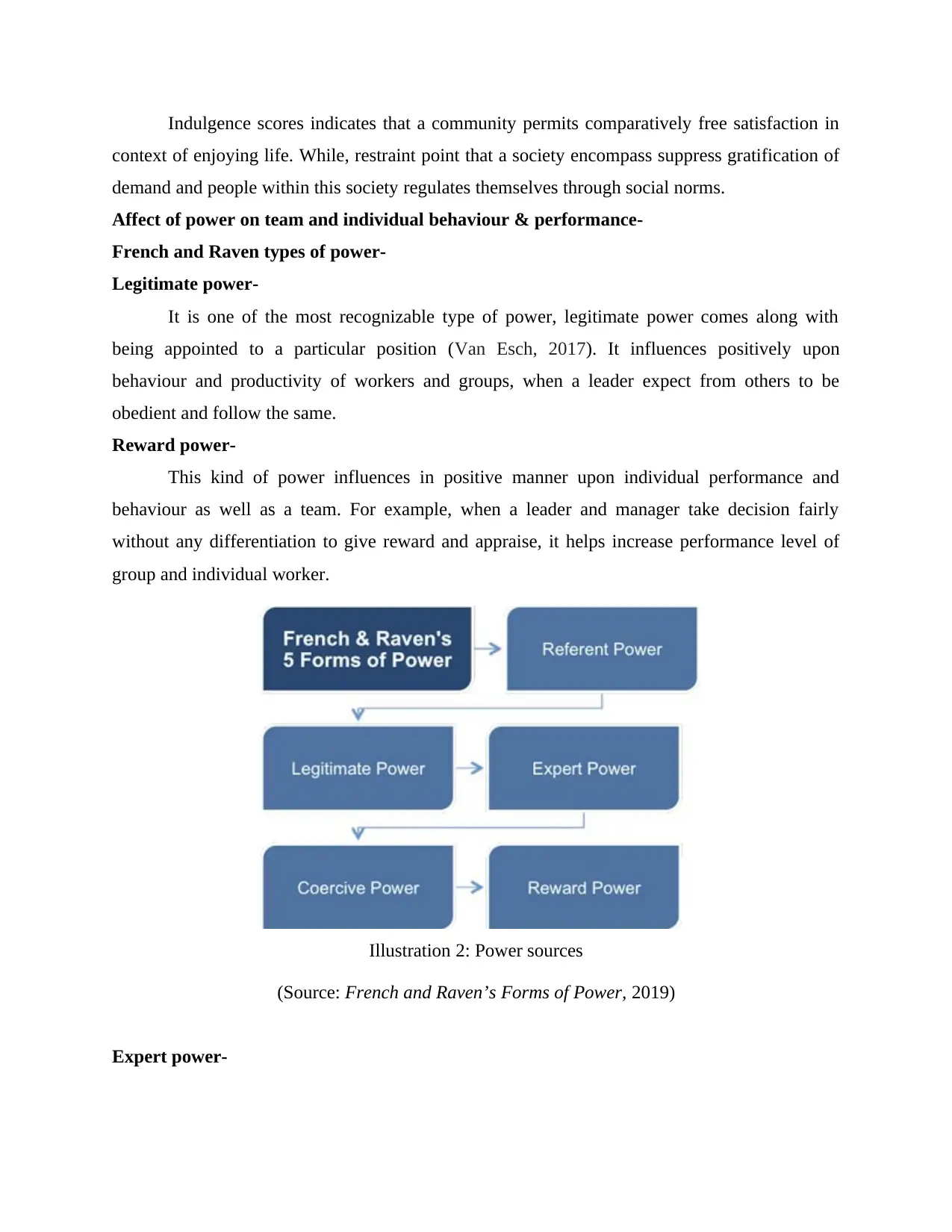
Indulgence scores indicates that a community permits comparatively free satisfaction in
context of enjoying life. While, restraint point that a society encompass suppress gratification of
demand and people within this society regulates themselves through social norms.
Affect of power on team and individual behaviour & performance-
French and Raven types of power-
Legitimate power-
It is one of the most recognizable type of power, legitimate power comes along with
being appointed to a particular position (Van Esch, 2017). It influences positively upon
behaviour and productivity of workers and groups, when a leader expect from others to be
obedient and follow the same.
Reward power-
This kind of power influences in positive manner upon individual performance and
behaviour as well as a team. For example, when a leader and manager take decision fairly
without any differentiation to give reward and appraise, it helps increase performance level of
group and individual worker.
Expert power-
Illustration 2: Power sources
(Source: French and Raven’s Forms of Power, 2019)
context of enjoying life. While, restraint point that a society encompass suppress gratification of
demand and people within this society regulates themselves through social norms.
Affect of power on team and individual behaviour & performance-
French and Raven types of power-
Legitimate power-
It is one of the most recognizable type of power, legitimate power comes along with
being appointed to a particular position (Van Esch, 2017). It influences positively upon
behaviour and productivity of workers and groups, when a leader expect from others to be
obedient and follow the same.
Reward power-
This kind of power influences in positive manner upon individual performance and
behaviour as well as a team. For example, when a leader and manager take decision fairly
without any differentiation to give reward and appraise, it helps increase performance level of
group and individual worker.
Expert power-
Illustration 2: Power sources
(Source: French and Raven’s Forms of Power, 2019)
⊘ This is a preview!⊘
Do you want full access?
Subscribe today to unlock all pages.

Trusted by 1+ million students worldwide
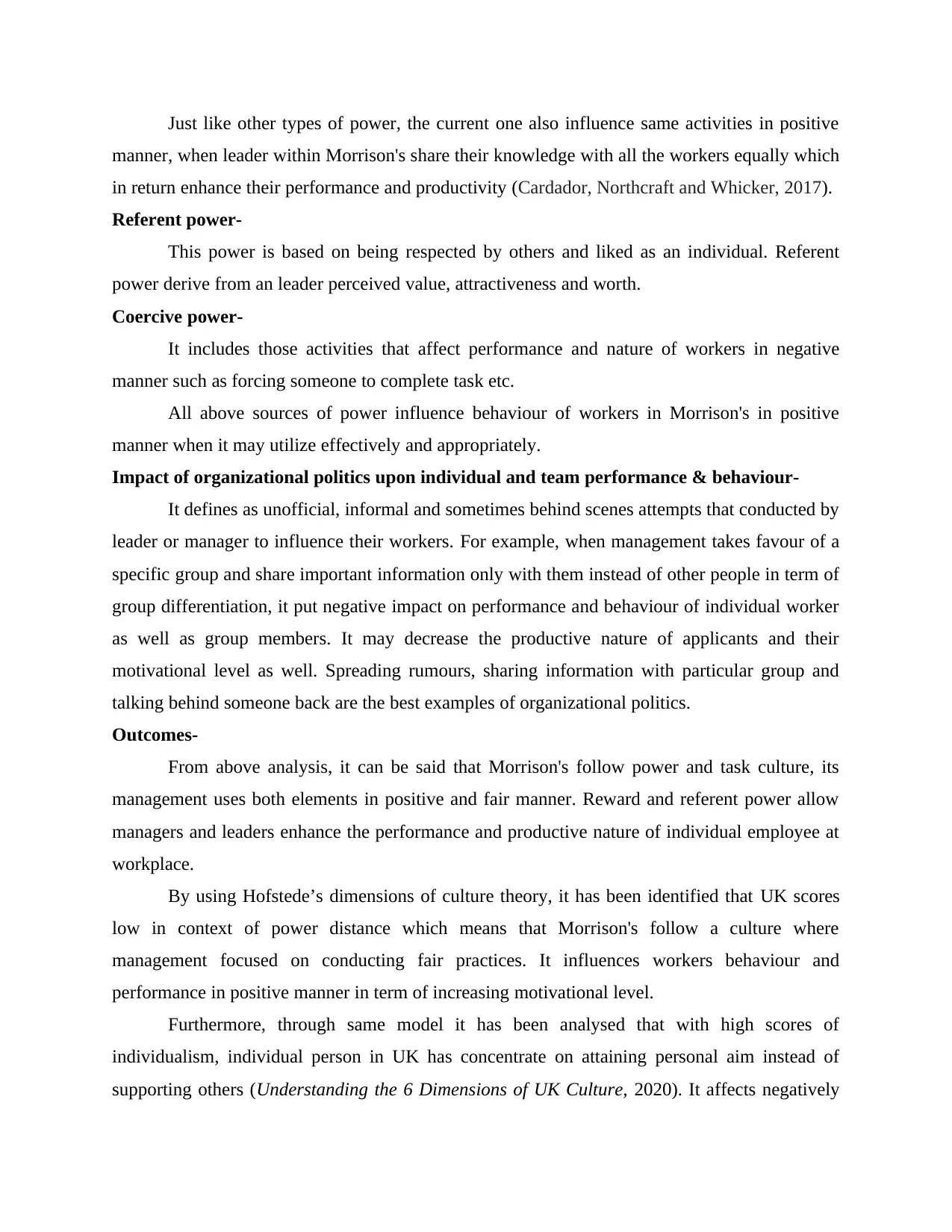
Just like other types of power, the current one also influence same activities in positive
manner, when leader within Morrison's share their knowledge with all the workers equally which
in return enhance their performance and productivity (Cardador, Northcraft and Whicker, 2017).
Referent power-
This power is based on being respected by others and liked as an individual. Referent
power derive from an leader perceived value, attractiveness and worth.
Coercive power-
It includes those activities that affect performance and nature of workers in negative
manner such as forcing someone to complete task etc.
All above sources of power influence behaviour of workers in Morrison's in positive
manner when it may utilize effectively and appropriately.
Impact of organizational politics upon individual and team performance & behaviour-
It defines as unofficial, informal and sometimes behind scenes attempts that conducted by
leader or manager to influence their workers. For example, when management takes favour of a
specific group and share important information only with them instead of other people in term of
group differentiation, it put negative impact on performance and behaviour of individual worker
as well as group members. It may decrease the productive nature of applicants and their
motivational level as well. Spreading rumours, sharing information with particular group and
talking behind someone back are the best examples of organizational politics.
Outcomes-
From above analysis, it can be said that Morrison's follow power and task culture, its
management uses both elements in positive and fair manner. Reward and referent power allow
managers and leaders enhance the performance and productive nature of individual employee at
workplace.
By using Hofstede’s dimensions of culture theory, it has been identified that UK scores
low in context of power distance which means that Morrison's follow a culture where
management focused on conducting fair practices. It influences workers behaviour and
performance in positive manner in term of increasing motivational level.
Furthermore, through same model it has been analysed that with high scores of
individualism, individual person in UK has concentrate on attaining personal aim instead of
supporting others (Understanding the 6 Dimensions of UK Culture, 2020). It affects negatively
manner, when leader within Morrison's share their knowledge with all the workers equally which
in return enhance their performance and productivity (Cardador, Northcraft and Whicker, 2017).
Referent power-
This power is based on being respected by others and liked as an individual. Referent
power derive from an leader perceived value, attractiveness and worth.
Coercive power-
It includes those activities that affect performance and nature of workers in negative
manner such as forcing someone to complete task etc.
All above sources of power influence behaviour of workers in Morrison's in positive
manner when it may utilize effectively and appropriately.
Impact of organizational politics upon individual and team performance & behaviour-
It defines as unofficial, informal and sometimes behind scenes attempts that conducted by
leader or manager to influence their workers. For example, when management takes favour of a
specific group and share important information only with them instead of other people in term of
group differentiation, it put negative impact on performance and behaviour of individual worker
as well as group members. It may decrease the productive nature of applicants and their
motivational level as well. Spreading rumours, sharing information with particular group and
talking behind someone back are the best examples of organizational politics.
Outcomes-
From above analysis, it can be said that Morrison's follow power and task culture, its
management uses both elements in positive and fair manner. Reward and referent power allow
managers and leaders enhance the performance and productive nature of individual employee at
workplace.
By using Hofstede’s dimensions of culture theory, it has been identified that UK scores
low in context of power distance which means that Morrison's follow a culture where
management focused on conducting fair practices. It influences workers behaviour and
performance in positive manner in term of increasing motivational level.
Furthermore, through same model it has been analysed that with high scores of
individualism, individual person in UK has concentrate on attaining personal aim instead of
supporting others (Understanding the 6 Dimensions of UK Culture, 2020). It affects negatively
Paraphrase This Document
Need a fresh take? Get an instant paraphrase of this document with our AI Paraphraser
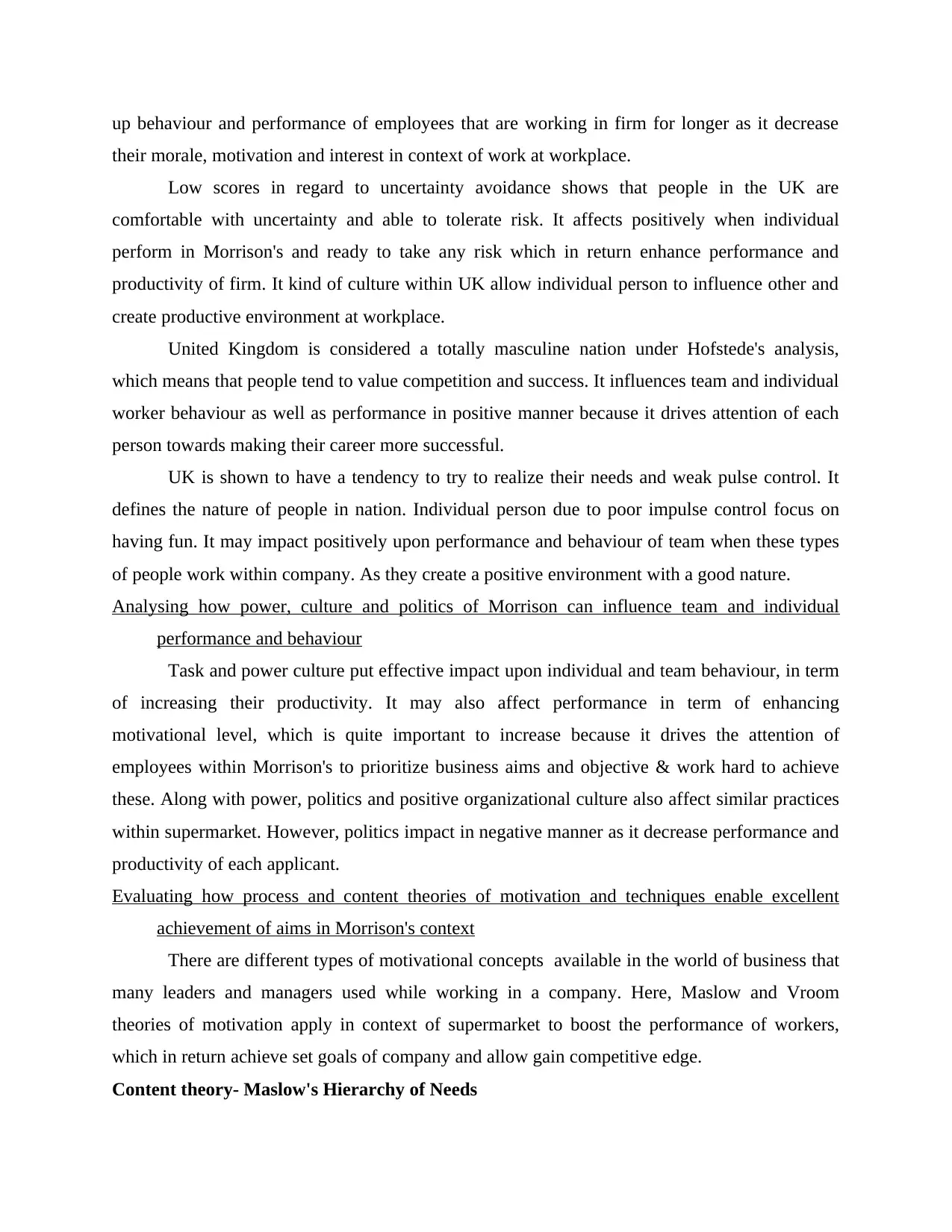
up behaviour and performance of employees that are working in firm for longer as it decrease
their morale, motivation and interest in context of work at workplace.
Low scores in regard to uncertainty avoidance shows that people in the UK are
comfortable with uncertainty and able to tolerate risk. It affects positively when individual
perform in Morrison's and ready to take any risk which in return enhance performance and
productivity of firm. It kind of culture within UK allow individual person to influence other and
create productive environment at workplace.
United Kingdom is considered a totally masculine nation under Hofstede's analysis,
which means that people tend to value competition and success. It influences team and individual
worker behaviour as well as performance in positive manner because it drives attention of each
person towards making their career more successful.
UK is shown to have a tendency to try to realize their needs and weak pulse control. It
defines the nature of people in nation. Individual person due to poor impulse control focus on
having fun. It may impact positively upon performance and behaviour of team when these types
of people work within company. As they create a positive environment with a good nature.
Analysing how power, culture and politics of Morrison can influence team and individual
performance and behaviour
Task and power culture put effective impact upon individual and team behaviour, in term
of increasing their productivity. It may also affect performance in term of enhancing
motivational level, which is quite important to increase because it drives the attention of
employees within Morrison's to prioritize business aims and objective & work hard to achieve
these. Along with power, politics and positive organizational culture also affect similar practices
within supermarket. However, politics impact in negative manner as it decrease performance and
productivity of each applicant.
Evaluating how process and content theories of motivation and techniques enable excellent
achievement of aims in Morrison's context
There are different types of motivational concepts available in the world of business that
many leaders and managers used while working in a company. Here, Maslow and Vroom
theories of motivation apply in context of supermarket to boost the performance of workers,
which in return achieve set goals of company and allow gain competitive edge.
Content theory- Maslow's Hierarchy of Needs
their morale, motivation and interest in context of work at workplace.
Low scores in regard to uncertainty avoidance shows that people in the UK are
comfortable with uncertainty and able to tolerate risk. It affects positively when individual
perform in Morrison's and ready to take any risk which in return enhance performance and
productivity of firm. It kind of culture within UK allow individual person to influence other and
create productive environment at workplace.
United Kingdom is considered a totally masculine nation under Hofstede's analysis,
which means that people tend to value competition and success. It influences team and individual
worker behaviour as well as performance in positive manner because it drives attention of each
person towards making their career more successful.
UK is shown to have a tendency to try to realize their needs and weak pulse control. It
defines the nature of people in nation. Individual person due to poor impulse control focus on
having fun. It may impact positively upon performance and behaviour of team when these types
of people work within company. As they create a positive environment with a good nature.
Analysing how power, culture and politics of Morrison can influence team and individual
performance and behaviour
Task and power culture put effective impact upon individual and team behaviour, in term
of increasing their productivity. It may also affect performance in term of enhancing
motivational level, which is quite important to increase because it drives the attention of
employees within Morrison's to prioritize business aims and objective & work hard to achieve
these. Along with power, politics and positive organizational culture also affect similar practices
within supermarket. However, politics impact in negative manner as it decrease performance and
productivity of each applicant.
Evaluating how process and content theories of motivation and techniques enable excellent
achievement of aims in Morrison's context
There are different types of motivational concepts available in the world of business that
many leaders and managers used while working in a company. Here, Maslow and Vroom
theories of motivation apply in context of supermarket to boost the performance of workers,
which in return achieve set goals of company and allow gain competitive edge.
Content theory- Maslow's Hierarchy of Needs

Physiological needs-
It includes food, water, home, and other basic needs that a person wants. Within
Morrison's, when the manager considers these needs of workers and provides without making
differentiation between employees, then it enhances the motivational level of an individual
applicant (de Negreiros and et.al., 2019). Motivated candidate always ready to work in any
situation, even they work hard to achieve business aims.
Safety needs-
This stages encompass financial security, health and safety against injury at workplace as
key elements. Manager within Morrison's by offering ESIC scheme to workers may attempt
increase their motivational level, because it provides health care benefits to individual person.
When a person obtains this kind of need, they feel high motivated and get ready to achieve
objectives of company.
Love and Belonging-
Respect, friendship, collaboration, and effective communication are included in the
category of social needs (Lam, 2020). Through effective communication and conducting
teamwork activities, leaders within Morrison's may encourage workers to contribute in the
context of gaining competitive advantages. It is one of the most common ways that a leader may
adopt in terms of showing love and belongingness to employees at workplace
Esteem-
This stage is classified into two categories, first one is esteem for oneself and second is
desire for respect and reputation from others. By considering the opinions and suggestions of
workers, leaders within Morrison's play vital role in term of motivating applicants. It enables
candidates to achieve aims of company.
It includes food, water, home, and other basic needs that a person wants. Within
Morrison's, when the manager considers these needs of workers and provides without making
differentiation between employees, then it enhances the motivational level of an individual
applicant (de Negreiros and et.al., 2019). Motivated candidate always ready to work in any
situation, even they work hard to achieve business aims.
Safety needs-
This stages encompass financial security, health and safety against injury at workplace as
key elements. Manager within Morrison's by offering ESIC scheme to workers may attempt
increase their motivational level, because it provides health care benefits to individual person.
When a person obtains this kind of need, they feel high motivated and get ready to achieve
objectives of company.
Love and Belonging-
Respect, friendship, collaboration, and effective communication are included in the
category of social needs (Lam, 2020). Through effective communication and conducting
teamwork activities, leaders within Morrison's may encourage workers to contribute in the
context of gaining competitive advantages. It is one of the most common ways that a leader may
adopt in terms of showing love and belongingness to employees at workplace
Esteem-
This stage is classified into two categories, first one is esteem for oneself and second is
desire for respect and reputation from others. By considering the opinions and suggestions of
workers, leaders within Morrison's play vital role in term of motivating applicants. It enables
candidates to achieve aims of company.
⊘ This is a preview!⊘
Do you want full access?
Subscribe today to unlock all pages.

Trusted by 1+ million students worldwide
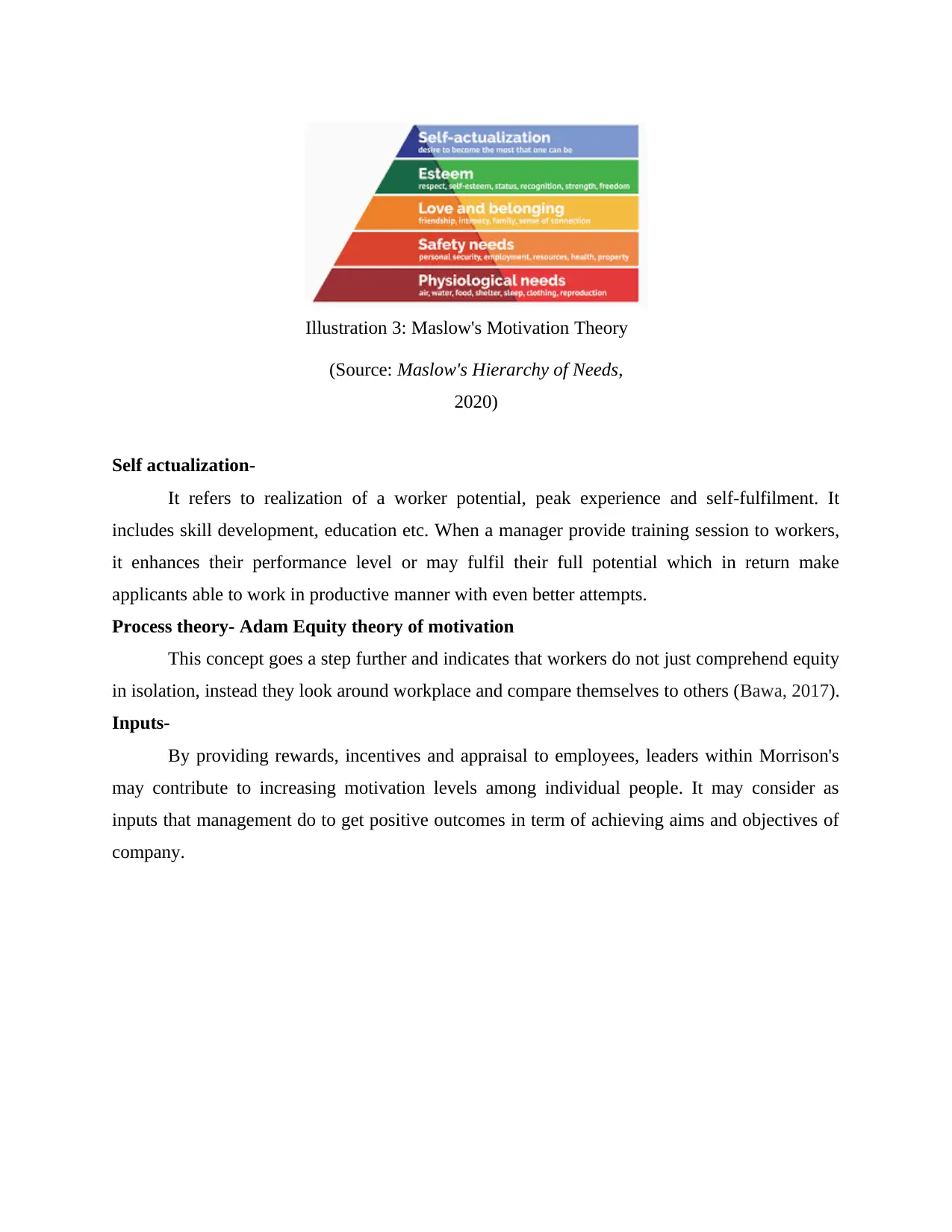
Self actualization-
It refers to realization of a worker potential, peak experience and self-fulfilment. It
includes skill development, education etc. When a manager provide training session to workers,
it enhances their performance level or may fulfil their full potential which in return make
applicants able to work in productive manner with even better attempts.
Process theory- Adam Equity theory of motivation
This concept goes a step further and indicates that workers do not just comprehend equity
in isolation, instead they look around workplace and compare themselves to others (Bawa, 2017).
Inputs-
By providing rewards, incentives and appraisal to employees, leaders within Morrison's
may contribute to increasing motivation levels among individual people. It may consider as
inputs that management do to get positive outcomes in term of achieving aims and objectives of
company.
Illustration 3: Maslow's Motivation Theory
(Source: Maslow's Hierarchy of Needs,
2020)
It refers to realization of a worker potential, peak experience and self-fulfilment. It
includes skill development, education etc. When a manager provide training session to workers,
it enhances their performance level or may fulfil their full potential which in return make
applicants able to work in productive manner with even better attempts.
Process theory- Adam Equity theory of motivation
This concept goes a step further and indicates that workers do not just comprehend equity
in isolation, instead they look around workplace and compare themselves to others (Bawa, 2017).
Inputs-
By providing rewards, incentives and appraisal to employees, leaders within Morrison's
may contribute to increasing motivation levels among individual people. It may consider as
inputs that management do to get positive outcomes in term of achieving aims and objectives of
company.
Illustration 3: Maslow's Motivation Theory
(Source: Maslow's Hierarchy of Needs,
2020)
Paraphrase This Document
Need a fresh take? Get an instant paraphrase of this document with our AI Paraphraser
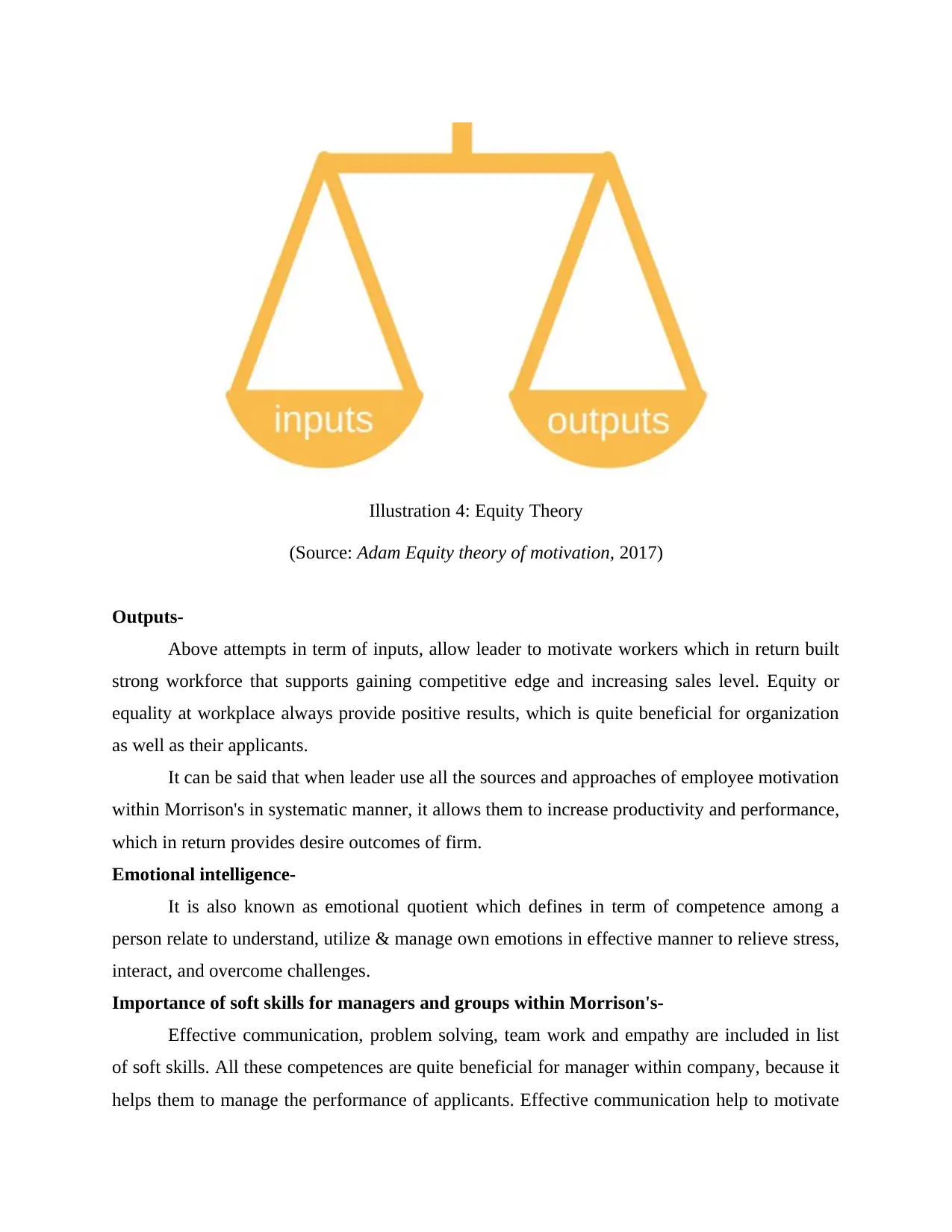
Outputs-
Above attempts in term of inputs, allow leader to motivate workers which in return built
strong workforce that supports gaining competitive edge and increasing sales level. Equity or
equality at workplace always provide positive results, which is quite beneficial for organization
as well as their applicants.
It can be said that when leader use all the sources and approaches of employee motivation
within Morrison's in systematic manner, it allows them to increase productivity and performance,
which in return provides desire outcomes of firm.
Emotional intelligence-
It is also known as emotional quotient which defines in term of competence among a
person relate to understand, utilize & manage own emotions in effective manner to relieve stress,
interact, and overcome challenges.
Importance of soft skills for managers and groups within Morrison's-
Effective communication, problem solving, team work and empathy are included in list
of soft skills. All these competences are quite beneficial for manager within company, because it
helps them to manage the performance of applicants. Effective communication help to motivate
Illustration 4: Equity Theory
(Source: Adam Equity theory of motivation, 2017)
Above attempts in term of inputs, allow leader to motivate workers which in return built
strong workforce that supports gaining competitive edge and increasing sales level. Equity or
equality at workplace always provide positive results, which is quite beneficial for organization
as well as their applicants.
It can be said that when leader use all the sources and approaches of employee motivation
within Morrison's in systematic manner, it allows them to increase productivity and performance,
which in return provides desire outcomes of firm.
Emotional intelligence-
It is also known as emotional quotient which defines in term of competence among a
person relate to understand, utilize & manage own emotions in effective manner to relieve stress,
interact, and overcome challenges.
Importance of soft skills for managers and groups within Morrison's-
Effective communication, problem solving, team work and empathy are included in list
of soft skills. All these competences are quite beneficial for manager within company, because it
helps them to manage the performance of applicants. Effective communication help to motivate
Illustration 4: Equity Theory
(Source: Adam Equity theory of motivation, 2017)
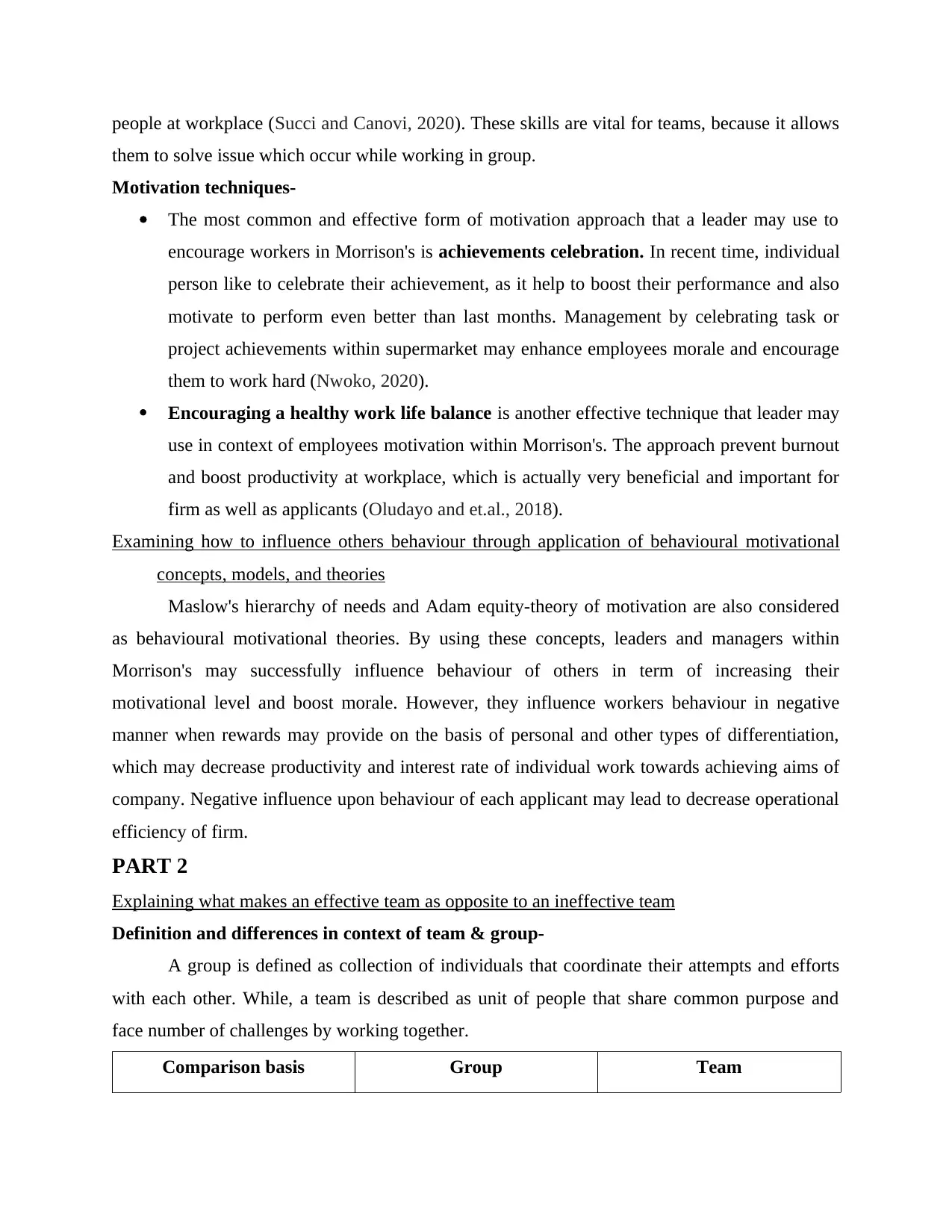
people at workplace (Succi and Canovi, 2020). These skills are vital for teams, because it allows
them to solve issue which occur while working in group.
Motivation techniques-
The most common and effective form of motivation approach that a leader may use to
encourage workers in Morrison's is achievements celebration. In recent time, individual
person like to celebrate their achievement, as it help to boost their performance and also
motivate to perform even better than last months. Management by celebrating task or
project achievements within supermarket may enhance employees morale and encourage
them to work hard (Nwoko, 2020).
Encouraging a healthy work life balance is another effective technique that leader may
use in context of employees motivation within Morrison's. The approach prevent burnout
and boost productivity at workplace, which is actually very beneficial and important for
firm as well as applicants (Oludayo and et.al., 2018).
Examining how to influence others behaviour through application of behavioural motivational
concepts, models, and theories
Maslow's hierarchy of needs and Adam equity-theory of motivation are also considered
as behavioural motivational theories. By using these concepts, leaders and managers within
Morrison's may successfully influence behaviour of others in term of increasing their
motivational level and boost morale. However, they influence workers behaviour in negative
manner when rewards may provide on the basis of personal and other types of differentiation,
which may decrease productivity and interest rate of individual work towards achieving aims of
company. Negative influence upon behaviour of each applicant may lead to decrease operational
efficiency of firm.
PART 2
Explaining what makes an effective team as opposite to an ineffective team
Definition and differences in context of team & group-
A group is defined as collection of individuals that coordinate their attempts and efforts
with each other. While, a team is described as unit of people that share common purpose and
face number of challenges by working together.
Comparison basis Group Team
them to solve issue which occur while working in group.
Motivation techniques-
The most common and effective form of motivation approach that a leader may use to
encourage workers in Morrison's is achievements celebration. In recent time, individual
person like to celebrate their achievement, as it help to boost their performance and also
motivate to perform even better than last months. Management by celebrating task or
project achievements within supermarket may enhance employees morale and encourage
them to work hard (Nwoko, 2020).
Encouraging a healthy work life balance is another effective technique that leader may
use in context of employees motivation within Morrison's. The approach prevent burnout
and boost productivity at workplace, which is actually very beneficial and important for
firm as well as applicants (Oludayo and et.al., 2018).
Examining how to influence others behaviour through application of behavioural motivational
concepts, models, and theories
Maslow's hierarchy of needs and Adam equity-theory of motivation are also considered
as behavioural motivational theories. By using these concepts, leaders and managers within
Morrison's may successfully influence behaviour of others in term of increasing their
motivational level and boost morale. However, they influence workers behaviour in negative
manner when rewards may provide on the basis of personal and other types of differentiation,
which may decrease productivity and interest rate of individual work towards achieving aims of
company. Negative influence upon behaviour of each applicant may lead to decrease operational
efficiency of firm.
PART 2
Explaining what makes an effective team as opposite to an ineffective team
Definition and differences in context of team & group-
A group is defined as collection of individuals that coordinate their attempts and efforts
with each other. While, a team is described as unit of people that share common purpose and
face number of challenges by working together.
Comparison basis Group Team
⊘ This is a preview!⊘
Do you want full access?
Subscribe today to unlock all pages.

Trusted by 1+ million students worldwide
1 out of 20
Related Documents
Your All-in-One AI-Powered Toolkit for Academic Success.
+13062052269
info@desklib.com
Available 24*7 on WhatsApp / Email
![[object Object]](/_next/static/media/star-bottom.7253800d.svg)
Unlock your academic potential
Copyright © 2020–2026 A2Z Services. All Rights Reserved. Developed and managed by ZUCOL.




